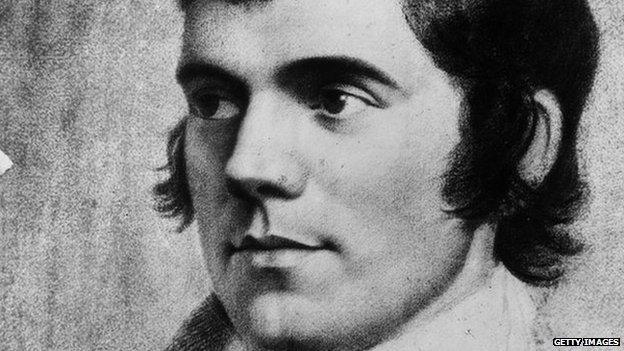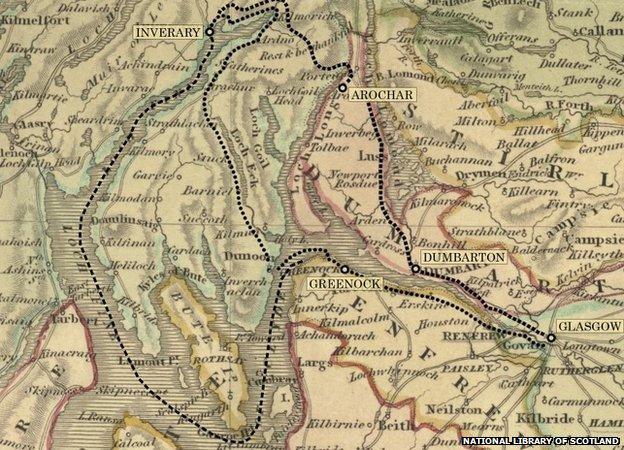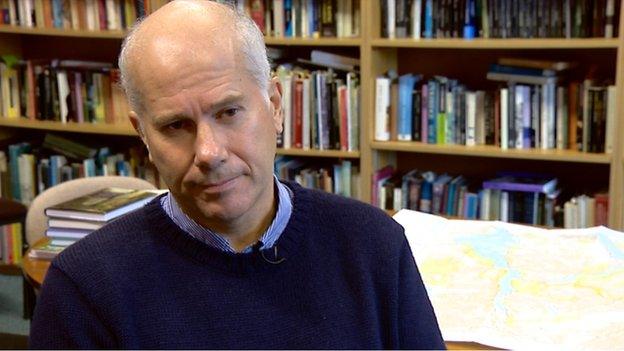Robert Burns: Rock star poet on tour 1787
- Published

Robert Burns toured Scotland at the height of his fame
At the height of his new-found fame Robert Burns embarked on a series of tours around Scotland, keeping company with some of the wealthiest and most powerful people in the land.
In 1787, the 28-year-old Robert Burns was suddenly a "celebrity", according to Prof Nigel Leask, regius chair of English Language and Literature at the University of Glasgow.
The 2nd Edinburgh edition of his poems had given him a quite a handsome pot of money and it had also made him famous, with the cream of Scottish society taking an interest in him.
Prof Leask says: "He was the lion of Scottish literature, everyone wants to meet him."
And Burns also wants to meet them, especially if they have the power to promote his work further and the cash to buy his books.
"Poets in the 18th Century depended on patronage so he tours around the gentry and nobles, really doing a bit of salesmanship," says Prof Leask.
Social versatility
Throughout 1787 Burns embarked on a series of tours, external, firstly around the Scottish Borders and northern England and then further afield to the west Highlands taking in Inveraray, Arrochar and dinner with Glasgow tobacco merchant George Buchanan at Arden House at Bannachra near Loch Lomond.

The route of Burns's tour of the west Highlands on a map from the time
Later in the year he toured the Highlands during which time he stayed with the Duke and Duchess of Atholl at Blair Castle, dined with the Duke and Duchess of Gordon at Castle Gordon and visited historical sites such as the Culloden battlefield and Cawdor Castle, which featured in Shakespeare's Macbeth.
Prof Leask says that Burns seems to have had letters of introduction from Edinburgh patrons that gained him access to the upper-echelons of Scottish nobility.
"He's not overawed by his posh surroundings," says Prof Leask.
"It shows his amazing social versatility. He's got an ability to move in all the circles of society.
"There is a sense of how thoroughly he was in the society and culture of the late 18th Century."
Prof Leask says: "It slightly qualifies the image of the 'heaven-taught ploughman' who does not have formal qualifications, who is just a genius endowed by nature.
"This shows how learned he was, how much he knew."

Prof Leask says Burns had access to the cream of Scottish nobility and gentry
Prof Leask says the tours of the Highlands are also important because it was a Lowlander's encounter with Gaelic culture, the Highland culture of Scotland.
During his travels he composes songs like the Birks of Aberfeldy and discovers his east coast heritage, visiting relatives in Stonehaven and Laurencekirk.
His father's family had a strong connection to the Jacobites in the north east.
As well as mixing with the Scottish nobility there was plenty of time for the rock star antics for which Burns has become well known.
Dancing and drinking
Prof Leask recounts how Burns stopped for the night at Arden House near Loch Lomond.
"He has a very convivial night of dancing and drinking and seeing the sun rise over Ben Lomond," says Prof Leask.
"He sets off the next day and has a horse race on the road down to Dumbarton with a Highland man he calls Donald, who is riding an unharnessed horse and Burns is riding Jenny Geddes, his old mare.
"He is determined not to be overtaken so he races and has an accident.
"It's a bit like two boy-racers on the A82 nowadays."
The tour journals are included in the new "Oxford Edition of the Works of Robert Burns: Commonplace Books, Tour Journals and Miscellaneous Prose".
Prof Leask says: "This is the first time the tours have been edited to scholarly standards and cross-referenced with his poems, songs and letters.
"It enables the reader to get a good sense of how these tours contributed to his emergence as a major world poet."